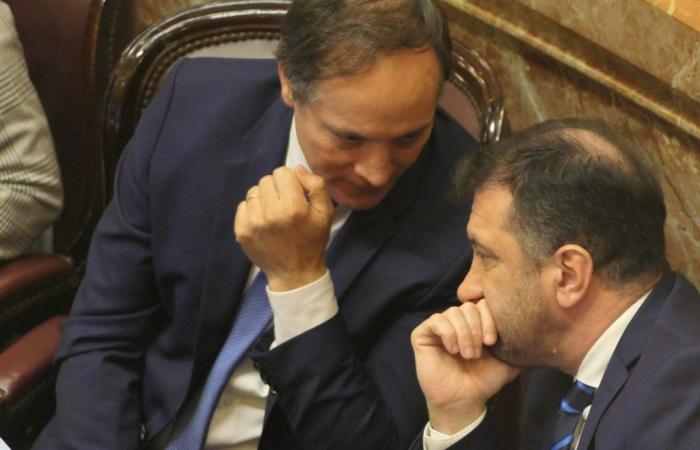
Cristina Elisabet Kirchner played hard. The concern was not so much about keeping his senators aligned to vote against the Bases Law but rather he was interested in the behavior of legislators today far from his influence. “There are 33 senators who did what we had to do, who represent the 44% who voted for us in November, we are not like Kueider, Camau and Scioli,” said Juliana Di Tullio after the Government achieved – with modifications – that the first official law was approved in the six months of administration.
But the former President (and former head of the Senate) failed to align other Peronists who had already let go of the leadership of Christianity. And that is why, in the few reactions that arose in K-space networks, lCristina herself posted in to senators in Entre Ríos and Corrientes, respectively, to the detriment of Stefanía Cora and Anita Almirón, women and Kirchnerist leaders who were second on their lists. A person familiar with when those electoral ballots were negotiated told Clarín that it was Cristina herself who blessed the two men to lead for a simple reason: both were taller and the pragmatic CFK did not hesitate to bless the nominations of those who today are considered “traitors” to the country by the K world.
The reading of describing the two Peronist senators who supported the Bases Law and the fiscal package as “traitors” is fanciful: both have long been away from Christian influence and play different parties.
Video
The government achieved a less ambitious reform plan than it wanted. But it has its law. Look at the analysis by Pablo de León, editor of Politics.
“Camau” Espínola operates in the scheme of so-called “federal Peronism”a nucleus that maintains differences with the K cycle, but had no qualms about sitting with the former President when agreeing on the last list for the Senate. In the recent parliamentary debate, he joined Kueider from Entre Ríos and Alejandra Vigo from Córdoba in demanding that Aerolíneas be removed from the list of companies to be privatized. Argentinas, Correo Argentino and the public media: all three are credited with having achieved this change by the negotiating team sent by Guillermo Francos. Those wills wanted to be broken, even with the telephone intervention of Sergio Tomás Massa. But nothing was changed and these three legislators “understand that they made a better law in addition to the changes in the RIGI,” according to a Peronist advisor to the Senate.
This week, prior to the debate in the Upper House of the laws, Kirchnerism circulated that “Camau” was negotiating with the national government to have control of the Yacyretá dam, since the legislator says that the Corrientes citizen pays the electricity more expensive than the rest of the country; and that is why he demands a royalty system similar to that of Salto Grande. After the law was approved, they came out with a video the interveners of the Correntino PJ to request the expulsion of Espínola from the party. María Teresa García and Máximo Rodríguez are the interveners, both very close to Cristina and Máximo Kirchner.
But the reason that would have defined Camau’s alignment is the promise he received from the administration of Javier Gerardo Milei to support the candidacy of the former Olympic sailor to compete in the election for governor of Corrientes which must be done next year. Corrientes must define a new governor in 2025 and Gustavo Valdés can no longer compete for a new re-election. The radical Valdés would like to encourage his brother for that fight and that has already generated noises in the local radicalism, which made the already three-time governor, the stainless Ricardo Colombi, come out to shake his candidacy for the dispute. A few Peronists promise a fight against “Camau” like the young Germán Braillard, from a traditional Corrientes political family.
Meanwhile, Edgardo Kueider is criticized by Kirchnerism for his closeness to the current Entre Ríos governor Rogelio Frigerio. It was the leader of Together for Change who guaranteed the 3 senators from Entre Ríos in favor of the law in general to the Government: one from the PRO, one from radicalism and the one from the PJ, Kueider.
Today, different spokespersons for Peronism recognize that “Milei won” and that they could not bring down the Bases Law, neither with the influence and play of Cristina nor with the mobilization of Congress on the day of the session, which not only was not massive. but rather it was co-opted by violent sectors of the left and some social organizations peripheral to Kirchnerism. The idea that the strongest unions would mobilize never happened and the CGT was left in a deliberative state, since the truck driver Pablo Moyano became angry with the most traditional leaders, such as Héctor Daer or Gerardo Martínez, who did not move a muscle to call for the protest. last Wednesday and Thursday.
Furthermore, Peronism lacks leadership: CFK maintains its own with La Cámpora at the helm, but in full internal relations with Governor Axel Kicillof, still ecstatic at having been received by Pope Francis, whom he had not met until now. And those who do not obey the former President full time do not make the restructuring of the PJ (Justicialist Party) move forward. The party’s electoral board has yet to define the preparation of the registry, the date of the internal election (it would be November 17) but all that is paralyzed. Only the leaders Santiago Cafiero, Gabriel Katopodis, Juan Manuel Olmos, Wado de Pedro and Jorge Milton Capitanich care about the matter. To them we must add two more: Cristina Álvarez Rodríguez: Eva Perón’s grandniece knew how to play with Felipe Solá, then with Daniel Scioli and, in the middle, she showed herself as a Cristinista. Today, she is a Kicillofista and traveled with the governor to the Vatican.
And who fights for a synthesis or consensus that does not exist today to manage the PJ is Ricardo Quintela, the governor of La Rioja, who in his aspiration to lead the national Party, visits the different provincial PJ, such as that of Chaco where the last week.
An empty shell that still seduces some Justicialists with longing.





